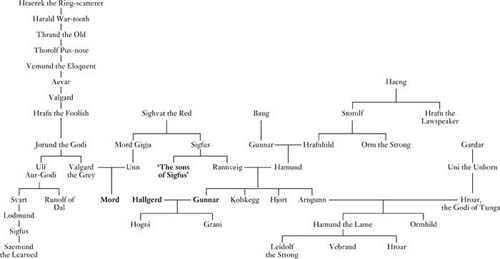Njal's Saga (56 page)
Authors: Anonymous

Chs. 100-105
contain an account of the Conversion of Iceland, coinciding in many ways with Ari's
Book of the Icelanders
and
Kristni saga
(The Saga of Christianity). Chs. 100â103 tell of the sometimes violent preaching mission of a Saxon named Thangbrand sent out by King Olaf Tryggvason. Hall of Sida is the first to be converted, and Njal is another who accepts the new faith. But Thangbrand returns to Norway and tells King Olaf of the hostility he faced, and the king is so angry that he plans to kill all the Icelanders within his reach. Gizurthe White and Hjalti Skeggjason, however, offer to go out to Iceland and spread the faith. The climax comes at the Althing in Ch. 105, when a battle seems likely, but Hall of Sida, speaking for the Christians, asks a pagan godi,
Thorgeir of Ljosavatn, to make the decision. After lying with a cloak over his head for a whole day, Thorgeir proclaims that there must be one faith â the Christian faith â and the dispute is settled peaceably.
Chs. 107-23
begin with the return of Valgard the Grey, Mord's father, to Iceland. He astutely sizes up the changed political situation â the new godi Hoskuld Thrainsson has diminished the power of Mord's godord â and proposes as a remedy that Mord spread slander between the Njalssons and Hoskuld which will lead to the slaying of Hoskuld. Mord does as his father advises, and is successful: in Ch. III the Njalssons, together with Kari and Mord, slay Hoskuld while he (like Gunnar in Ch. 53) is sowing grain in his field. Hoskuld offers no resistance and dies saying âMay God help me and forgive you.' Njal is so grief-stricken at the news that he says he would rather have lost two of his sons than Hoskuld, and he predicts that the slaying will lead to his death and that of his wife and all his sons.
The duplicitous Mord initiates legal proceedings against the Njalssons, calculating that when it is revealed that he inflicted one of the wounds, the case will be invalidated. Flosi sets out for the Althing with a large force of men and stops at Ossabaer, the home of his widowed niece Hildigunn. In one of the most emotional scenes in this saga and the best goading scene in all the sagas (Ch. 116), Hildigunn places on Flosi's shoulders the bloody cloak in which Hoskuld was slain and charges him to accept nothing less than blood vengeance. At the Althing the Njalssons, with the help of Asgrim Ellida-Grimsson, enlist the support of Gizur the White, Gudmund the Powerful of Modruvellir in the north, and Gudmund's brother Einar of Thvera. Other men whose booths they visit, however, refuse to give their support (Chs. 119â20).
When Thorhall Asgrimsson, on the side of his foster-father Njal, declares the suit invalid because of Mord's involvement in the slaying, Njal seeks for an arbitrated settlement. Flosi agrees, and each side chooses six arbitrators; their decision is that the compensation for the death of Hoskuld Thrainsson should be six hundred ounces of silver (three times the normal amount). Njal and his sons collect the money and bring it to the Law Council, and Njal places a robe and a pair of boots on top of the money. Flosi arrives, and in a scene of great tension â he senses an insult in Njal's gifts â asks who placed the robe there. No reply. He asks again. Skarphedin asks him who he thinks might be responsible, and Flosi explodes with a vile insult to Njal, calling him by the ugly and well-worn epithet âOld Beardless'. Skarphedin, who showed himself a master of insults in Chs. 119â20 when they were seeking help, accuses Flosi of being âthe sweetheart of the troll at Svinafell' â and all hopes for peace are ended.
In
Chs. 124â30
Flosi gathers a hundred men to attack the Njalssons at home, vowing that âwe'll ride to Bergthorshvol in full force and attack the Njalssons with fire and iron, and not leave until they're all dead' (Ch. 124). The atmosphere is laden with portents: an old woman at Bergthorshvol curses a pile of chickweed, saying that it will eventually be ignited to burn Njal in his house (Ch. 124); a man named Hildiglum has a vision of a man as black as pitch setting fire to mountains by throwing a torch (Ch. 125); Njal himself has a vision of the destruction of the hall (Ch. 127). When Flosi and his men arrive, Njal has his sons go inside even though their chances are better outside, and in spite of Skarphedin's prediction that Flosi will use fire. After some heavy fighting Flosi realizes that he will indeed have to resort to fire. He offers the women and children and Njal free exit, and most leave, but Njal and Bergthora and Kari's son Thord remain inside and lie down together. The others continue the fight. In the fire eleven members of the household die; Helgi Njalsson is beheaded by Flosi as he tries to escape dressed as a woman. Unsuspected by the other side, and to their great dismay when they hear of it, Kari Solmundarson makes his escape in the smoke.
Chs. 131â45
. The first chapters (131â7) describe the gathering of forces for an unsuccessful attempt to hunt down Flosi, Flosi's enlistment of support (Ch. 134), and preparations for the forthcoming legal contest at the Althing. There are two interludes, the removal of the burned bodies in Ch. 132 (those of Njal and Bergthora and the boy Thord are miraculously unburned) and Flosi's dream in Ch. 133. In Ch. 138, at the Althing, Flosi enlists the legal services of Eyjolf Bolverksson, âone of the three greatest lawyers in Iceland', and pays him with a gold bracelet. On the other side, Mord has taken over the prosecution from Thorgeir Skorargeir (Njal's nephew), and he is to be assisted by the Njal-trained Thorhall Asgrimsson, confined to his booth with an infected leg. In Chs. 139â40 Gizur the White gains support from Snorri the Godi and Gudmund the Powerful against the men who burned Bergthorshvol.
The legal procedures themselves begin with long and repetitive recitations of legal formulas â caviar to the general
â
followed by a strenuous to-and-fro argument about the validity of the panel chosen to reach a preliminary finding, with .Mord sending a messenger to Thorhall for advice in each case. When Mord and Thorhall have finally won their point, Eyjolf pulls his trick: Flosi has secretly become a thingman of a godi from the north, which means that the case has been prosecuted in the wrong quarter court (Ch. 143). Thorhall's response is to summon Flosi and Eyjolf for having given and received payment for legal services. They present this charge before the Fifth Court, as is proper, since it involves violation of Althing procedure.
But then Eyjolf tricks them into overlooking a technicality, one that was spelled out by Njal when he proposed the Fifth Court in Ch. 97 - that the number of judges must be reduced from forty-eight to thirty-six before a judgement can be rendered. When Thorhall hears about this (beginning of Ch. 145) he is so angry that he drives his spear into his leg to let the infection flow out, makes his way to the Fifth Court and kills the first man on Flosi's side that he meets, a kinsman of Flosi. Thus begins the greatest full-scale battle of the saga, ironically at a hallowed place where men were forbidden to fight.
Chs. 145â59
. After the battle, Ch. 145 continues with efforts at peace initiated by the ever-temperate Hall of Sida. He persuades Snorri the Godi to head an arbitration panel of twelve men, who deliver verdicts on compensation and punishment. Flosi is to leave the country for three years, and some of the others responsible for the burning (henceforth referred to as âthe burners') for life. Kari and Thorgeir Skorargeir refuse to be party to the agreement, but after a time, when they have killed five of the burners, Thorgeir agrees to a settlement with Flosi (Ch. 147). Kari, whose son Thord was uncompensated after being burned at Bergthorshvol, continues his course of vengeance alone, except for the company of the blustering Bjorn the White (Chs. 148-52), whose presence offers welcome comic relief. At the end of Ch. 152 Kari tells .Thorgeir that thirteen of the burners have been killed (see note 1 to Ch. 152) and that he plans to kill two more. He does this abroad, killing Gunnar Lambason in Orkney (Ch. 155) and Kol Thorsteinsson in Wales (Ch. 158), both by sudden decapitation. For the first killing he incurs the wrath of Earl Sigurd, until Flosi speaks up for him and says âhe did what he had to do'.
Chs. 154
â
7 contains an Icelandic version of the battle of Clontarf (called âBrian's battle' in the saga), fought outside Dublin on Good Friday 1014, between the Christian King Brian and heathen forces led by Earl Sigtrygg of Dublin. Its relevance to the story of
Njal's Saga
is slight, apart from the fact that Earl Sigurd of Orkney died on the heathen side, along with fifteen of the burners. The account of the battle, in which Brian fell but his enemies were defeated, is followed by a number of miraculous visions in different northern countries, the most famous of which is the
Song of Dorrud
. The only long poem in the saga (eleven stanzas), it tells of a man named Dorrud at Caithness, witnessing through a window the weaving of a bloody web (signifying the battle) by twelve valkyries.
The final two chapters (158
â
9) return to a more sober world and record the pilgrimages to Rome undertaken by Flosi, and then by Kari. Two years after Flosi returned to his farm at Svinafell, Kari sails to Iceland and is
shipwrecked at Ingolfshofdi. He and his men walk from there to Svinafell, where there is instant reconciliation between the two opponents. As a seal of the reconciliation, Kari, whose wife Helga Njalsdottir had died, marries Flosi's niece Hildigunn, whose first husband Hoskuld had fallen under the blows of the Njalssons and Kari.
Â
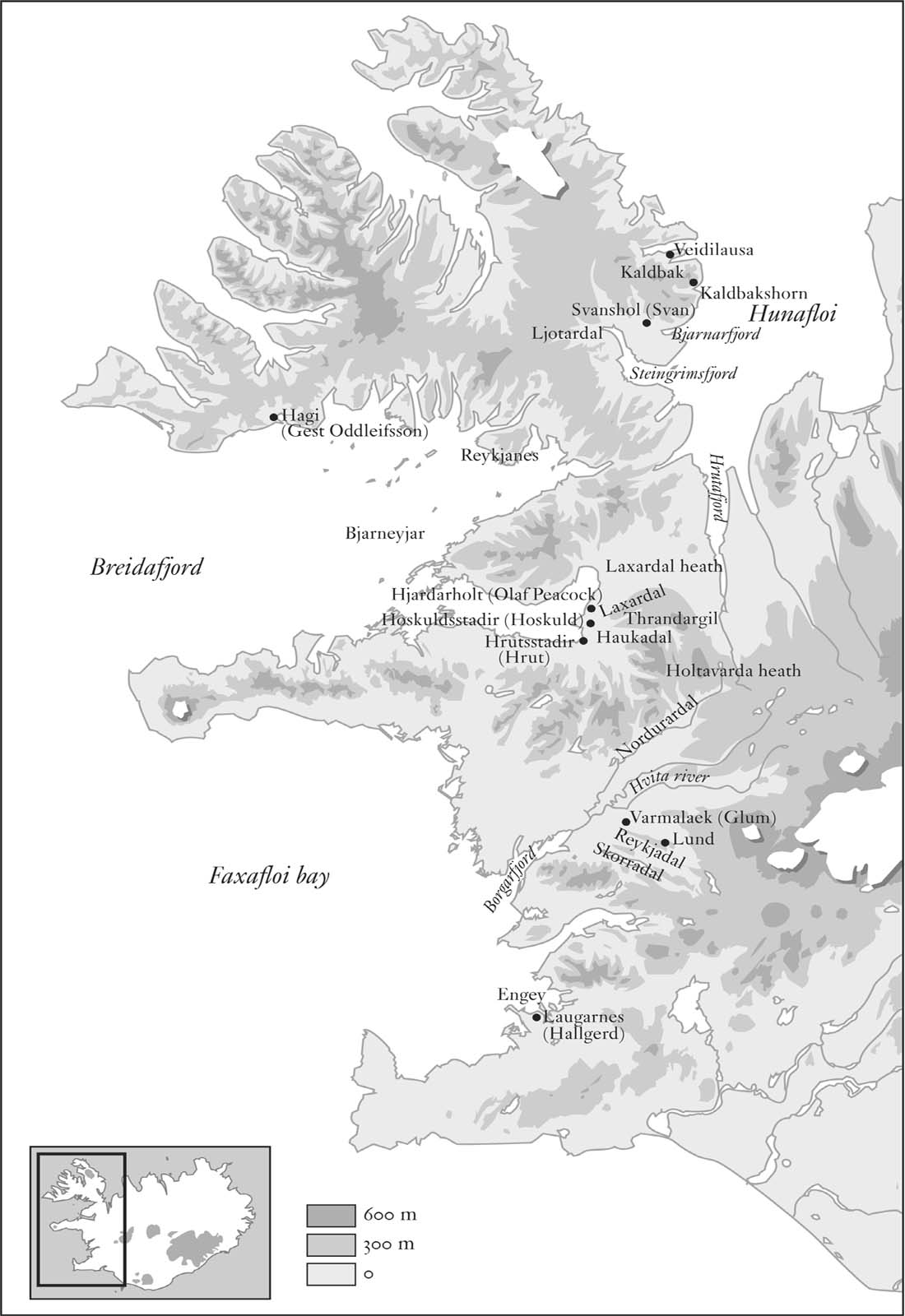
Â
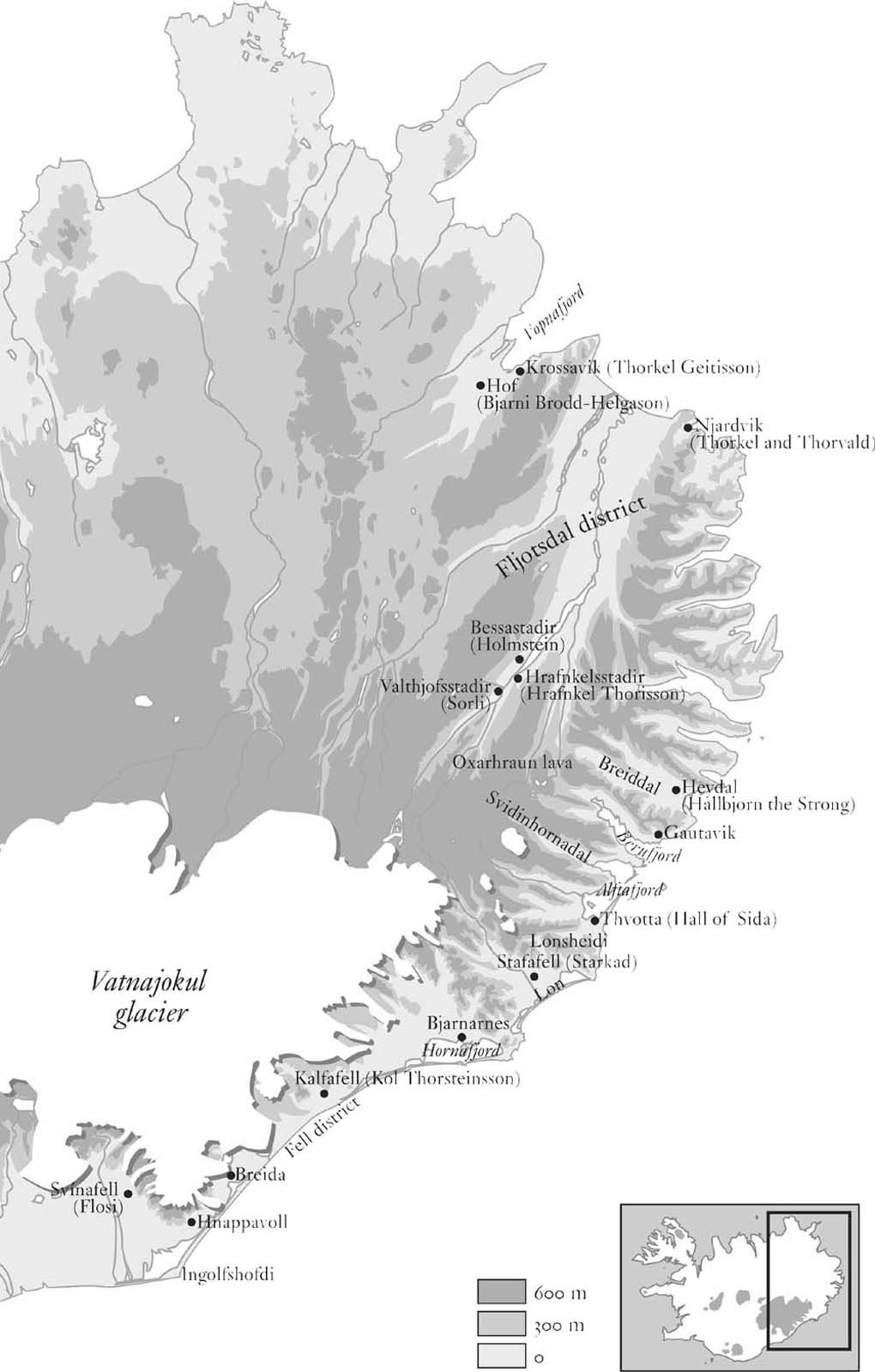
Â
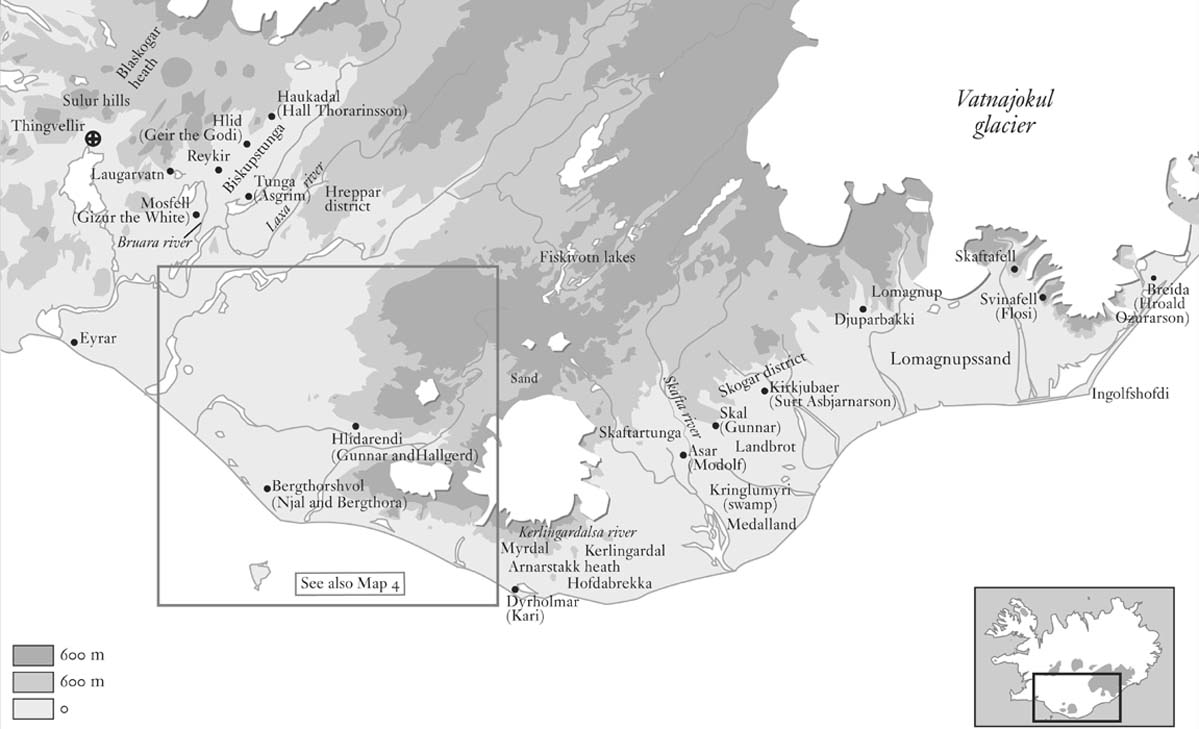
Â
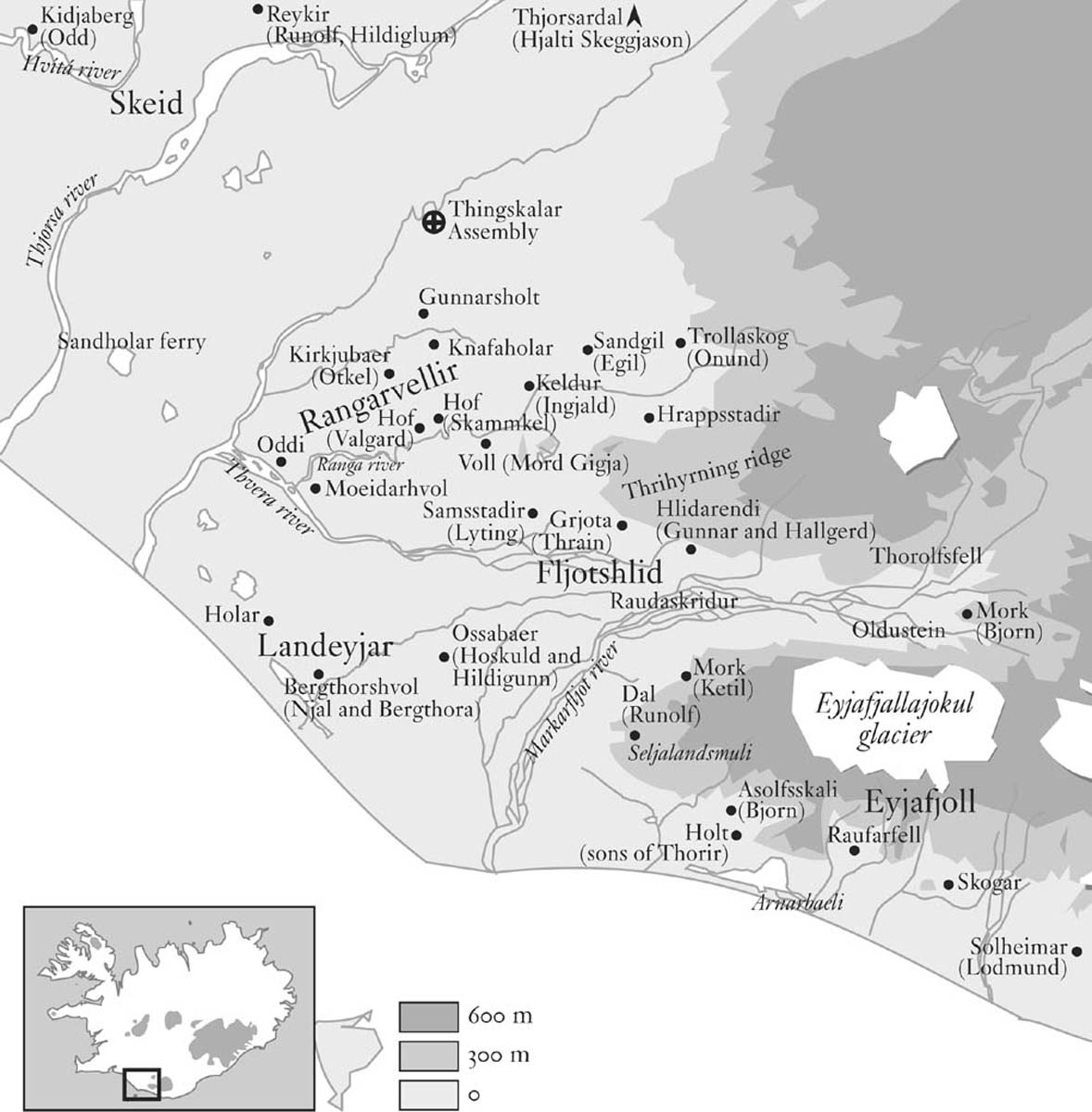
1. The family of Gunnar of Hlidarendi
